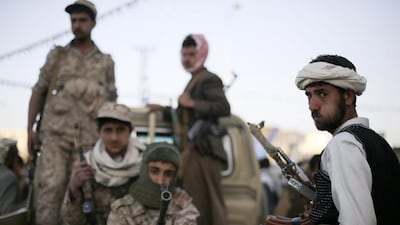Six months into the Saudi-led campaign against the Houthi rebels in Yemen, coalition forces have experienced a deadly setback that is likely to further strengthen the Arab forces’s role in Yemen. On Friday, a rocket attack on a weapons store killed 45 Emirati soldiers in the eastern province of Maarib. On the same day, 10 Saudi soldiers and five Bahrainis also lost their lives.
Houthi officials declared responsibility for the attack and said it was “revenge” for the six-month air campaign carried out by the Saudi-led coalition. The attack follows a string of gains made by the coalition on the ground in Aden and adjacent southern provinces, and as coalition forces prepare to retake Marib province.
Thousands turned out at funerals across the UAE to pay their respects and express solidarity with the soldiers’ families. The high casualty rate is certainly an unprecedented loss for the nation and this terrible tragedy will not be forgotten. But authorities and citizens have made clear the attack will only increase their resolve and determination to continue the fight.
The development may also redefine the nature of the coalition’s role in the Yemen conflict. Many observers have previously misunderstood the purpose of the Arab forces’ participation in the campaign. Even though the offensive received popular support – since it was a rare bold move by Sunni countries against what they considered to be an Iranian proxy – the strategic benefit of the operation had remained largely misconstrued.
The long-term purpose of the campaign is grounded in the realisation that the diplomatic route initiated and backed by the Gulf states is now undeliverable.
The GCC plan for a transition in Yemen had been designed to save the country from the scenarios that led to the destruction of Libya and Syria. Also, unlike in the past when Saudi Arabia relied on the central government of former president Ali Abdullah Saleh to restrain or contain forces such as the Houthis and Al Qaeda, the Gulf no longer had such a partner.
The Gulf countries found themselves faced with the colossal task of building an able government that could stabilise the country and work with its neighbours on border and internal security. Air strikes alone are not enough. Leadership and sacrifice might be costly for the coalition but it is necessary.
However, unlike, say, the US-led invasion of Iraq, the Gulf countries did not cause the civil war in Yemen. They only responded to it, first through a commendable diplomatic and economic project and then through a military campaign.
The Gulf’s formula for success in Yemen will require firm leadership as well as engagement with nationalist forces from across the spectrum.
The Arab forces have no other choice. Mr Saleh and his former entourage that led Yemen cannot be trusted again and the Houthis have become too powerful to restrain through diplomacy or local proxies. The operations by the Arab coalition were not a premature and aggressive muscle-flexing against Iran. They followed the disruption by the Houthis of a peaceful process of state-building which, without intervention, threatened to turn Yemen into a quagmire.
So the continuing military campaign has to succeed where diplomacy failed. This includes a state-building project that requires leadership on the ground and a long-term effort to help the country build its nationalist forces and stand on its feet again. The cost of the war has to be set against the potential cost of allowing the problem to fester and engulf the whole neighbourhood.
The death of the Emirati, Bahraini and Saudi soldiers on Friday will inevitably refocus attention on these potential risks and benefits.
For the people in the Gulf, the purpose of the campaign will become clearer now. It is no longer a distant war but one that matters to everyone, to their security and to the stability of a country they are tied to through lineage and history. A successful campaign to build a stable Yemen will be the most effective way to honour those who have lost their lives.
Hassan Hassan is associate fellow at Chatham House’s Middle East and South Africa Programme, a non-resident fellow at the Tahrir Institute for Middle East Policy and co-author of ISIS: Inside the Army of Terror
On Twitter: @hxhassan

